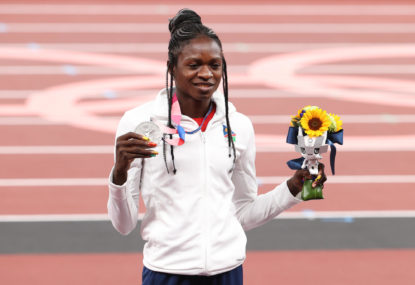'An iconic roster': LeBron, Steph, KD headline all-star cast for Team USA's shot at Olympic glory
LeBron James is going back to the Olympics for the first time in 12 years. Steph Curry is headed to the games for the…
Opinion

I know many people have issues with women who have naturally high levels of testosterone competing at the 2021 Tokyo Olympic Games, with the latter athletes now referred to as Athletes with Differences in Sex Development (DSD).
While World Athletics introduced rules from 2018 to prevent DSD athletes with testosterone levels above five nanomoles/litre competing in events from 400m to 1500m, now critics of such athletes point to two such athletes from Namibia (Christine Mboma and Beatrice Masiling) making the 200m final, with one winning a medal.
For example, the former Olympian runner and current Channel Seven commentator Tamsyn Lewis expressed concern about Mboma doing so well.
In the semi-final, Mboma charged down the straight to finish second in a super-fast personal best of 21.97 behind the three-time Olympic champion Elaine Thompson-Herah, before finishing second again in the final with 21.81, another world junior record.
I understand.
There are many, not just World Athletics officials, that are very concerned about the image of DSD athletes winning and dominating female events, as evident at the 2016 Rio Olympics when DSD athletes won all three medals in the 800m – South Africa’s Caster Semenya, Burundi’s Francine Niyonsaba and Kenya’s Margaret Wambui.
After all, as should have always been obvious to World Athletics, DSD athletes have the potential to do well in any track and field event given their high level of testosterone, as now revealed by the 200m results.
It should have already been obvious that testosterone helps all events.
One study of the East European female dominance during the 1980s confirms how important anabolic steroids and hormones were with regard to success in power and speed events.
But while exogenous use of hormones is rightfully banned, it remains a tricky issue with DSD athletes given their higher levels of testosterone are natural.
While Manou has previously stated “nobody wants to exclude anyone from competing in sport”, I am not sure how this ideal can ever be appeased by her plea “to separate elite sport from community and club sport” given the testosterone advantage that DSD athletes have.
But any concern by Manou, or anyone else, should not be directed at successful DSD athletes at the Tokyo Olympics.
With the highly-ranked Christine Mboma and Beatrice Masiling ruled ineligible to compete in the 400m at Tokyo due to naturally high testosterone levels, World Athletics legitimised and supported their right to compete in the shorter sprints.
If we are to talk about DSD athletes, then commentators may also choose to say more about any US female sprinters coached by athletes who were previously caught on testosterone.
If we are going to rave on again and again about the very best in terms of past Olympic glory, then why not remind listeners about how the Jamaican Anti-Doping Commission only conducted just one out-of-competition test in the six months leading up to the 2012 Olympic Games in London.
All these facts are indeed interesting talking points.
Sure, we know World Athletics will eventually try to ban the DSD athletes from the sprint events.
They will adopt such measures to protect their image and to encourage participation from female athletes with more normal testosterone levels given that 99 per cent of females have levels below three nanomoles/litre.
But this debate is not over.
How can it be that the former male Laurel Hubbard is allowed to compete in Olympic weightlifting, yet former Olympic champion and DSD athlete Caster Semenya is banned despite being considered female her entire life?
While Hubbard upholds the testosterone rules in her sport of weightlifting, under the far more generous limit of below ten nanomoles per litre starting 12 months before competition, this is twice the level allowed of DSD athletes by World Athletics.
In addition, Hubbard gained some physical advantage from her 34 years as a male, which included vast weightlifting experience.
So let us not belittle the achievement of DSD athletes at the 2021 Tokyo Olympics given they were indeed good enough to make Olympic finals and win medals, having met the eligibility requirements of World Athletics, which is clearly much tougher than other Olympic sports.
While it’s important for sports fans and governing bodies to continue demanding fairness, it’s important they don’t start punishing the wrong people in that endeavour.